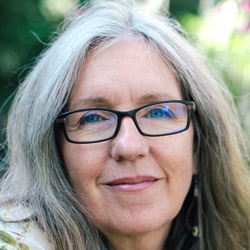

Search Results: activism
-
If withdrawal is your stress pattern, you likely want to belong and yet have habits of expression that others find uninviting. Instead, soften, relax, and open your posture and energy. Find something that will bring you to smile. Engage with others -- make eye contact, smile, walk towards others, say hello, and sit in an open posture. Let others know that you're a bit overwhelmed, but want to connect and are glad to be here.
-
Enmeshment refers to confusion about who is responsible for what. This lack of clear boundaries results in attempts to manage the other person's experience as a substitute for managing your own. When you think you're contributing to another person, but you're actually acting from enmeshment, there's inner tension and contraction. Read on for 16 common signs of enmeshment so that you can know when to pause and connect to your needs.
-
Notice when you start to defend. Is your body tensing up? Feeling desperate for the other to understand you or your intentions? Find yourself explaining your behavior, giving all the good reasons why you did what you did? Trying to convince the other of your good intentions? If so, ask yourself: “Is this what I want to be doing right now? Is this really helping?” then practice one of these eight options.
-
To resolve conflict, information of what's important to each party, plus corrections, needs to be included and built upon. Here we explore nine patterns of ongoing conflict, including diagnosis; assuming understanding; refuting; unhelpful communication mediums; over focus on intent over effect; and “hit-and-run” engagement. This is part one of a two part series.
-
Here we explore variants of conflict patterns in part two (of this two part series) that include: refuting "straw man arguments"; not checking understanding, repeating unhelpful behaviour; repeatedly asking for what's already given; asserting rather than demonstrating responsiveness; assumptions; denying conflict exists; neglecting interdependence; stonewalling; absence of curiosity, humility, respect, empathy or care (even when reflecting).
-
Making decisions from overwhelm can be costly for you and others. Instead, to get distance name overwhelm as it comes. Apply self-compassion. Be suspicious of your impulse to withdraw. Find ways to meet your needs. Tell others about your overwhelm. This may allow more support, connection and trust-building. Plan what to do to meet your needs next time you're overwhelmed. Tweak your plan.
-
When outraged or resigned over polarized issues, pause to ask yourself who may be benefiting from this conflict? What are we not paying attention to that’s even more important? What matters most? Am I being distracted away from something more important? What do I really want? Where can I choose to focus attention and action for the wellbeing of all life on the planet (which is also my wellbeing and the well being of those I love)?
-
Anger is neither good nor bad. When you don't foresee it or you haven't cultivated a relationship to anger, you may behave from it and hurt yourself and others. There are three reasons anger may rise: primitive anger, resistance, and lack of resources. For practicing with these last two types of anger, we'll look at four practices: cultivate awareness, pause and expand, self-care and planning, and allow grief.
-
Hear how gratitude helps stay present and at peace in daily life.
-
Print-and-cut these 71 needs cards for one-on-one, partner or group activities, to help support the pratice of empathy. Includes nine blank cards for you to customize.
-
Reveal what's in your heart before asking a question to help build trust, especially if you're in an authority figure. Otherwise, your question may sound like a demand, blame, trap, intrusion or accusation, and it may elicit a defensive response. If you get a "question" like that, give them empathy. Read on for reflection questions to see how our revealing and our withholding impacts our relationships with others and with ourselves.
-
Our inner world shapes what we do, including the results we see in relationships and social change efforts. Physical and verbal actions are expressions of what’s happening in our minds. If we want certain outcomes, it helps to be mindful of the intentions we plant within ourselves.
-
Print-and-cut these 56 feelings cards for one-on-one, partner or group activities, to help support the pratice of empathy. Includes eight blank cards for you to customize.
-
Why is it so difficult to change our patterns even when we want to, even when we experience shame or despair about them? Arnina Kashtan offers some of the common pitfalls and concrete steps to overcome them in the future.
-
- Discover what is yours to do in response to our growing global crises
- Weave nonviolence more deeply into how you live and lead
- Receive ongoing support within and beyond the course in how to be effective and alive while doing what’s yours to do
- Increase your capacity to face and mourn current reality as a source of greater choice and energy
- Be a part of transforming the legacy of scarcity, separation, and powerlessness into a livable future
-
-
John and Stephanie combine mediating conflict, parenting and study of brain science to this ground-breaking course recording on how to funnel your anger and your child’s anger toward mutual caring and peace.
-
When we have few external resources (money, time, health connections, etc), we can still empower ourselves and one another. We can strengthen our internal resources, inspire people to join our cause, build solidarity, and influence others who have external resources to support us and our causes.
-
What could be, more often than not, overlooked when we think about or represent NVC or Marshall Rosenberg's work? This article busts some commonly held ideas and approaches to NVC. It challenges us to widen the lens of what it really means to be "life-serving", or speaking and hearing the "language of life". And it also speaks to how thinking can deepen feeling and relatedness...
-
Society gives us short-sighted explanations about human nature, life and what’s (un)changeable. The coronavirus pandemic is disrupting that explanation. Our current social order upholds impoverishment, police brutality, and is leading us towards our extinction. Change begins with people mobilizing resources towards a vision that holds systemic care for all, plus engages shared risk and collective action towards that vision.

Quick Links
Subscription Preferences
Stay In Touch!
Looking for ways to keep up with NVC Academy news, get special offers, free resources, or words of inspiration? Here are five ways to stay engaged:



















